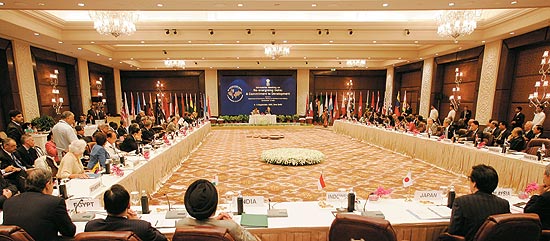I believe it is. There. I’ve said it.
Let me assure you that I take no pleasure in this. I wish it wasn’t true. But it’s time to stop fooling ourselves. The current round of World Trade Organization talks is as dead as a doornail.
It’s defeated, destroyed, and defunct. And now it has become something even worse. It’s a distraction.
On March 22, trade ministers began a “stock-taking exercise” in Geneva. What? You didn’t hear about it? Of course not: It was just another meaningless gyration in a negotiation that won’t ever end except in failure.
We should stop the charade. The United States must take the lead and work to improve the flow of goods and services across borders–not participate in empty diplomatic rituals simply for the sake of keeping up appearances.
Make no mistake: I would love for the Doha round to succeed. I’ve spent years advocating it. I’ve tried to nudge it forward at meetings around the world. I agree with the Copenhagen Consensus, a panel of economists that includes five Nobel laureates. They believe that Doha has the potential to increase global wealth by $3 trillion per year, with four-fifths of this sum going to people in developing countries, who have the most to gain.
Yet Doha is as dead as the dodo. We should stop deluding ourselves. In the future, trade barriers will fall not through massive multilateral negotiations, but in regional and bilateral agreements. The sooner Americans grasp this reality, the better off we’ll be.
The Doha round is named for the city in Qatar where talks began in 2001. That’s when observers say it “launched.” Well, Doha failed to achieve orbit. No other round has dragged on for this long. Like a rocket that didn’t fire properly, Doha has come crashing down to earth.
I’m not interested in searching through the wreckage, at least not now. As with Agatha Christie’s “Murder on the Orient Express,” there’s no single villain in this drama. Industrialized nations have too many trade-distorting subsidies, including in agriculture. Developing nations aren’t sufficiently willing to open their markets to foreign competition or to protect intellectual property rights. Nobody seems to appreciate the most basic rule of trade talks: To get something, you must give up something.
Politicians still pay lip service to Doha. President Obama mentioned its importance in his State of the Union address in January. At the G-20 conference in Pittsburgh last September, world leaders told their trade ministers to wrap up the Doha talks by December of this year.
These words are the rhetorical equivalent of “Weekend at Bernie’s,” the movie about a couple of guys who drag around their boss’s corpse in order to trick others into thinking that he’s still alive. Public officials seem to think that if they mention Doha enough times in their speeches, the rest of us will believe that there’s still some life remaining.
Yet the rigor mortis has set in. Here in the United States, it’s obvious to anyone who is paying attention. Obama says he wants to double exports in five years and negotiate a Trans-Pacific Partnership. These are worthy objectives, but he won’t even push much smaller but already negotiated trade pacts with Colombia, Panama and South Korea through Congress. But let’s be honest, the problem is bipartisan. Both sides of the aisle lack political will. The nominations of Michael Punke as U.S. ambassador to the WTO and Islam A. Siddiqui as chief agricultural negotiator (two good people) are languishing, even though both men won unanimous backing from the Senate Finance Committee.
Critics will say that the United States can’t possibly back out of Doha because doing so would represent an abdication of American leadership. Alas, there would be some truth to this claim. Yet nobody is leading the way on Doha right now. The talks sputter on without purpose–or genuine hope of success.
There may be another way of looking at the situation. By simply acknowledging what has happened, the United States could lead the world into new discussions.
Doha may be dead, but the case for Doha is not! It’s time to move on.
Dean Kleckner, an Iowa farmer, chairs Truth About Trade & Technology. www.truthabouttrade.org Mr. Kleckner was the only farmer on the U.S. advisory team to the GATT negotiations when they began in September 1986 in Uruguay. Kleckner served on the U.S. Trade Advisory Committee, first appointed by President Reagan, reappointed by President Bush, and reappointed twice by President Clinton.

